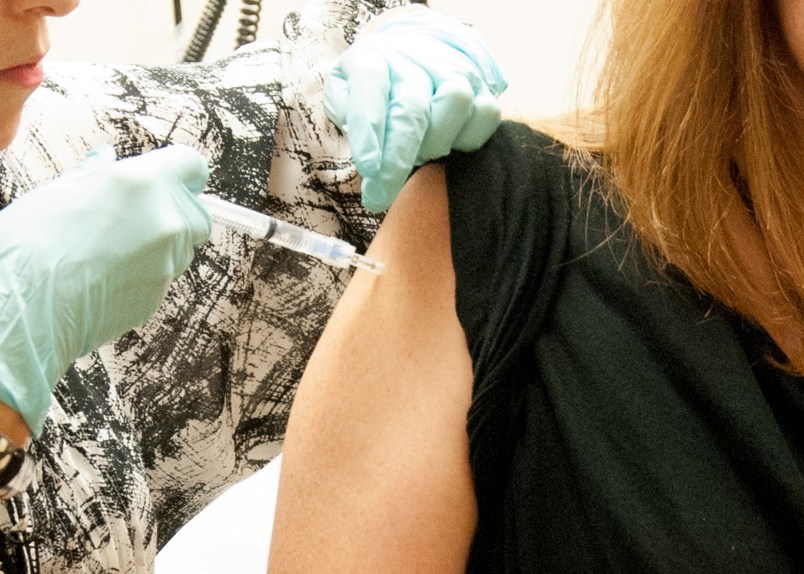Drugmakers are racing to develop vaccines and drugs to address the worst outbreak of Ebola in history. It’s unclear who will pay for their products, but companies are betting that governments and aid groups will foot the bill.
There are no proven drugs or vaccines for Ebola, in large part because the disease is so rare that up until now it’s been hard to attract research funding. And the West African nations hardest hit by the outbreak are unlikely to be able to afford new Ebola vaccines and drugs.
But governments and corporations now are shifting millions of dollars to fight Ebola in the wake of the outbreak that has infected nearly 10,000 people and killed over 4,800. Experts say drugmakers are wagering that international groups and wealthier governments like the U.S. will buy Ebola vaccines and drugs in mass quantities to stockpile them for future use once they’re deemed safe.
“The political bet is that the U.S. and World Health Organization have been so embarrassed and burned by this event that they will be willing to change the way they do business,” said Professor Lawrence Gostin of the Georgetown University Law School, who studies global health issues.
Drugmakers have benefited from stockpiling before. During the bird flu pandemic of 2009, Western governments spent billions to stock up on drugs and vaccines that mostly went unused. Shelf-life varies by product, but can be as little as a year.
Still, it’s unclear who will pay for the Ebola vaccines that are in development, even after a WHO meeting on Thursday that included government officials, drugmakers and philanthropic groups.
“Something concrete needs to be developed soon,” said Dr. Manica Balasegaram of Doctors Without Borders, who attended the meeting. “This needs to done in tandem for us to prepare for when these vaccines are deployed in the larger scale beyond clinical trials.”
Even with the uncertainty, drug companies are rushing to begin testing in patients.
Johnson & Johnson said last week it will begin safety testing in early January of a vaccine combination that could protect against an Ebola strain that is “highly similar” to the virus that triggered the current outbreak.
The New Brunswick, New Jersey, company is spending up to $200 million to speed up production of the vaccine, which it licensed in part from a Danish company last month. If safety tests are successful, the company hopes to begin large clinical trials in May 2015.
The two leading Ebola vaccines in the pipeline have largely been funded by government efforts, but their testing is being completed by a combination of corporate and public financing.
Human trials of a vaccine co-developed by the U.S. National Institutes of Health and GlaxoSmithKline are being funded by the company, its charitable trust and funds from the U.S. and U.K. governments. It is being tested for safety in the U.S., U.K. and Mali. GSK said it might be able to make about 1 million doses of its vaccine per month by the end of 2015, assuming that some logistical and regulatory hurdles can be overcome.
A small U.S. drugmaker, NewLink Genetics, holds the license on the second front-runner vaccine, which was initially developed by the Public Health Agency of Canada and has been sent to the U.S. Walter Reed Army Institute of Research in Maryland for testing on healthy volunteers, with preliminary safety results expected by December.
Dr. Marie-Paule Kieny from the U.N. health agency told reporters last week that millions of doses could be available in 2015 in West Africa if early tests proved that the two leading experimental vaccines are safe and provoke enough of an immune response to protect people from being infected with Ebola. Kieny also said five other possible Ebola vaccines should start being tested in March, but she gave no details about who is making them, or where those five vaccines would be tested.
Virologist Ben Neuman said the unprecedented focus on Ebola also will benefit smaller companies that are developing drugs that can slow the diseases, such as MAPP Pharmaceuticals of San Diego and Tekmira Pharmaceuticals of Canada.
“There are lots of very promising options out there,” said Neuman, a professor at the University of Reading in Britain. “One of the treatments or vaccines that they are trying now is going to work. But we don’t know which one.”
While there are no reliable estimates of the potential market size for an Ebola drug or vaccine, some drugmakers have already seen their stocks rise on the potential of the therapies in their pipelines.
Neuman noted that while Ebola was only confirmed at the end of March, there were reports of suspected Ebola in January. Tekmira’s stock price tripled between January and April of this year.
“For small pharma, the fate of the company can turn on one drug like these,” he said.
In 2009, Roche saw sales of its Tamiflu antiviral medication jump by $1.74 billion as governments around the world snapped up drugs in anticipation of a bird flu outbreak that never materialized. The U.S. has provided billions of dollars of incentives to reinvigorate flu vaccine production by companies like Glaxo and Novartis. Because of complex testing and manufacturing procedures, vaccines are expensive to produce and only a handful of companies compete in the space.
The U.S. government’s Biomedical Advanced Research and Development Authority also awards federal contracts to keep drugmakers producing other emergency countermeasures, including antibiotics, anthrax vaccines and treatments for botulism. But since September, the agency has allocated more than $32 million toward companies working on vaccines and drugs for Ebola.
“To me, Ebola is a game changer,” Gostin said. “All the things we thought about in terms of research priorities and development of drugs and vaccines need to be rethought.”
Copyright 2014 The Associated Press. All rights reserved. This material may not be published, broadcast, rewritten or redistributed.







In the context of the US Healthcare system, the business models for vaccines suck - there isn’t a strong recurring revenue stream.